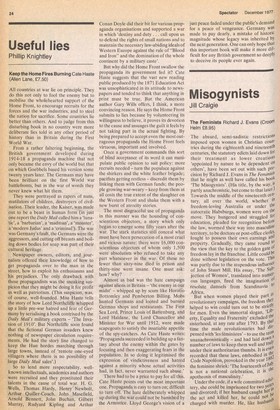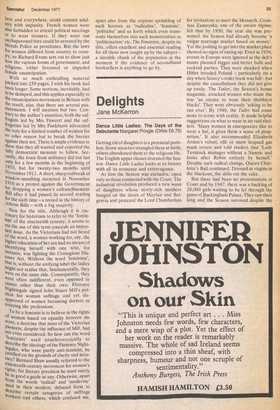Misogynists
Jill Craigle
The Feminists Richard J. Evans (Croon) Helm E8,95) The absurd, semi-sadistic restrictions imposed upon women in Christian wan tries during the eighteenth and nineteenth centuries, the statutory edicts laid down for their treatment as lower creations 'appointed by nature to be dependent on others', have been set out with such Pre' cision by Richard J. Evans in The Feminists that he might as well have called his book 'The Misogynists'. (His title, by the way, partly anachronistic, but come to that later.) Towards the middle of the nineteenth cen" tury, all over the world, whether in freedom-loving Australia or under the autocratic Habsburgs, women were on the move. They hungered and struggled for education, pleaded for recognition before the law, wormed their way into masculine territory, to be doctors or post-office clerksj fought to possess their own earnings all' property. Gradually, they came round to the view that the key to the golden gate of freedom lay in the franchise. Little could bo done without legislation on the vote. This was partly due to the stupendous influenee of John Stuart Mill. His essay, 'The Suh" jection of Women', translated into nuttier: ous languages, fired the imagination 0' resolute damsels from Scandinavia Africa. But when women played their part in revolutionary campaigns, the freedom the,Y helped to win could turn out to be stricttY for men. Even the immortal slogan, 'Lib' erty, Equality and Fraternity' excluded thet sisterhood, at any rate after 1793. By the time the male revolutionaries had di5.' pensed with 'les fenninistes' to use the ter°. unanachronistically — and had laid down,' number of laws to keep them well and trinY under their authoritarian thumbs. It is 01°2 recorded that these laws, embodied in tn1,71 Code Napoleon, provoked in the year 18°' the feminine shriek: 'The fourteenth of' is not a national celebration, it is the Under the code, if a wife committed au°, tery, she could be imprisoned for two year.; and divorced; if her husband caught her,le the act and killed her, he could not ° charged with murder. He, like husbands here and everywhere, could commit adultery with impunity. French women were also forbidden to attend political meetings or to wear trousers. If they went out unchaperoned they could be arrested by the Morals Police as prostitutes. But the laws for women differed from country to coun try., so Richard Evans sets out to show just now the vIrious forms of government, and religions, either favoured or impeded female emancipation.
With so much enthralling material Packed into 250 pages, I wish his book had been longer. Some sections, inevitably, had to be skimped, and this applies especially to the emancipation movement in Britain with the result, alas, that there are several misstatements. I will mention but two. Contrary to the author's assertion, both the suffragists led by Mrs Fawcett and the suffragettes led by Mrs Pankhurst advocated the vote for a limited number of women for no other reason but to break the barrier against their sex. There is ample evidence to Show that they all wanted and expected the fully democratic measure to follow. Secondly, the truce from militancy did not last Only for a few months in the beginning of 1910, but for twenty-two months until November 1911. A short, sharp outbreak of Window-smashing occurred in November 1910 as a protest against. the Government for dropping a women's enfranchisement Dill after it had passed its second reading for the sixth time — a record in the history of reform Bills — with a big majority. Now for the title. Although it is customary for historians to refer to the *minisrn' of the nineteenth century, it seems to the the use of this term conceals an important issue. As the Victorians had not heard Of the word, a woman working for, say, the higher education of her sex had no means of identifying herself with one who, for instance, was fighting the Contagious Diseases Act. Without the word 'feminism', that is, without the unifying label the ladies might not realise that, fundamentally, they were on the same side. Consequently, they were often indifferent, even opposed to causes other than their own. Florence Nightingale signed John Stuart Mill's petition for woman suffrage and yet disapproved of women becoming doctors or entering the professions. To be a feminist is to believe in the rights elf women based on equality between the sexes, a doctrine that most of the Victorian Pioneers, despite the influence of Mill, had not even considered. So how can the word 'feminists used anachronistically to describe the ideology of the Florence Nightingales, who were partly anti-feminist, be justified on the grounds of clarity and accuracy? Bernard Shaw usually referred to the nineteenth-century movement for women's riights; for literary precision he must surely ,ue as good a guide as any. Otherwise, apart 'Tom the words 'radical' and 'moderate' used in their modern, debased form to describe certain categories of suffrage workers and others, which confused me, apart also from the copious sprinkling of such horrors as 'radicalise', leminise, 'politicise' and so forth which even transmute themselves into such monstrosities as 'politicisation' etc. The Feminists, despite its title, offers excellent and essential reading for all those now caught up by the subject — a sizeable chunk of the population at the moment if the evidence of .secondhand booksellers is anything to go by.











































 Previous page
Previous page